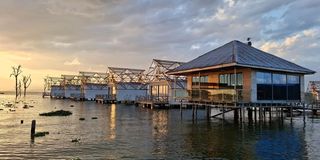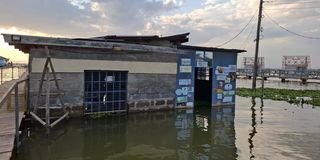Too close! NEMA stops developers from constructing 'Lake view' cabins

Some of the cabins that remain operational despite being surrounded by waters from lake Naivasha.
Lake Naivasha's shores have degraded over the years due to continuous human activity and more significantly, climate change.
Excessive rainfall has caused flooding along the lake's banks, while developers have constructed buildings close to the shore, violating environmental laws to provide visitors with lakeside accommodations.
These actions have put a strain on the freshwater lake.
This environmental degradation and illegal development have not gone unnoticed by local authorities.

One of the buildings fully submerged in water due to the rise of Lake Naivasha along South Lake road.
In a recent move to address these issues, government institutions in Nakuru County have taken action against two developers along the Naivasha South Lake Road.
These developers have received warning letters instructing them to cease development after it was discovered they had established their properties on the banks of the lake, in violation of environmental regulations.
Owners of Kentwood Cabins and Camp and Paradio Hotel received these warnings from the National Environment Management Authority (NEMA) and the Water Resources Authority (WRA) respectively.
According to NEMA Nakuru County Director of Environment, Joseph Kopejo, the proprietor of Kentwood Camp was issued a notice after environmental inspectors conducted a ground inspection on 16th September 2024, revealing the owner had not acquired an Environmental Impact Assessment (EIA) license before establishing the camp.
“The proprietor of Kentwood Resort proceeded with construction activities without having acquired an EIA which is in contravention to the environmental laws,” says Kopejo in the letter.
Following this, the proprietor has been instructed to cease construction immediately, conduct an EIA, and submit the report to the Authority within fourteen days for a decision.
WRA issued a letter dated September 13, 2024, to the proprietor of Paradio Hotel. The letter instructs the owner to cease construction and demolish permanent structures built along the lake's riparian land.
According to the WRA Sub Basin Area Coordinator, A. Kiamba, the proprietor not only constructed several housing units along the lake but is currently backfilling (refilling) the riparian land to prevent lake water from flooding his premises.
“Backfilling will change the contour line marking the extent of the riparian land. Building of permanent structures, disposal of effluent or wastewater without treatment among others are prohibited without prior written approval of WRA,” warns Kiamba.
The proprietor is therefore instructed to stop backfilling the riparian land and demolish all permanent structures within the riparian land, failure to which WRA will take the necessary legal action.
According to an environmental expert, EIAs are an important tool to conserve the environment hand in hand with development, helping to ensure healthy and sustainable growth.
Catherine Kariuki, an Environmental Scientist, says EIAs help in early identification of the potential risks right before the project starts. Once done, experts can advise on the mitigation measures to conserve the environment and avoid irreversible damage to the same.
“On the other hand, riparian zones act as buffer zones to absorb flood waters. When you remove this vegetation, you're essentially saying you don't care about enhancing flooding, habitat destruction, soil erosion, protecting biodiversity and water pollution,” Kariuki explains.
“Seeing that Lake Naivasha is a tourist destination, the construction of hotels on riparian zones further interferes with wildlife corridors, their movement, and pollution which puts a lot of pressure on the environment. Animals require specific habitats, and disrupting these can have far-reaching consequences,” she adds.
Kariuki expresses concern about the increased pressure on the environment due to tourism and human activity and believes the current situation stems from ignorance and arrogance.
“But we must also ask- where are the officers? Who are these developers who seem to have no fear of the law, and what's hindering officers from enforcing regulations? Riparian land should not be used for development, just like wetlands. There should be no compromise on this – it's a complete no-go zone for developers,” she says.
Kariuki strongly advocates for the strict enforcement of environmental laws and the mandatory implementation of EIAs for all development projects near sensitive ecosystems like Lake Naivasha and asserts that this approach is crucial for balancing development needs with environmental conservation.


